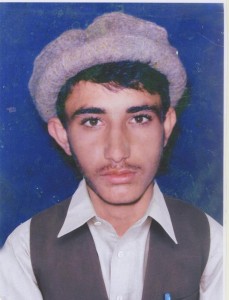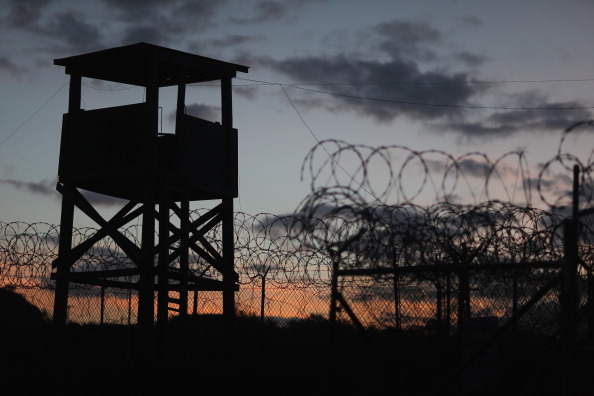
Obaidullah, from Afghanistan, has been in U.S. military custody since July 2002 (Photo Credit: Private).
By Rob Freer, Amnesty International Researcher on the USA
Imagine this.
You are 19-years-old, asleep in your family home in a remote rural village. In the middle of the night, foreign soldiers burst in.
They put a hood over your head and force you to sit against a wall. You are terrified.
After a few hours, bound hand and foot and still hooded, you are taken to a military base.
There you are physically assaulted, interrogated, threatened with a knife and deprived of sleep and food. You fear you will be killed.
After what you think is about 48 hours – your disorientation makes it difficult to know for sure – you are bundled, still hooded and shackled, into a helicopter and flown to another, larger military facility. There the interrogations and abuse continue.
Three months later, you are taken from your cell, your head is shaved, you are put into shackles and blacked-out goggles, and you and some others are thrown into a transport plane and tied down like cargo.
This time, you are flown to a naval base on the other side of the world, specifically chosen by your captors to keep detainees like you out of the reach of courts or lawyers. You are held indefinitely, interrogated, perhaps prosecuted in front of an improvised military tribunal, or just warehoused.
Whatever hope you had of justice dissipates as you are kept year after year after year without ever being brought to trial and without knowing when, if ever, you will be released.
You are still in a cell in that naval base today, more than a decade later.
Obaidullah does not have to imagine this.
Obaidullah's experience illustrates the human rights violations to which the Guantánamo detainees have been subjected over the years, and the failure of the U.S. to rectify those wrongs.
He is some 8,000 miles from his home in Afghanistan. His daughter, born two days before he was seized, is now 11, only eight years younger than Obaidullah was when taken from his home.
The U.S. would surely condemn such treatment as contradicting basic notions of decency and human rights if any other government was responsible.
But the U.S. has operated Guantánamo as if the Universal Declaration of Human Rights never existed. Obaidullah’s experience illustrates the human rights violations to which the Guantánamo detainees have been subjected over the years, and the failure of the U.S. to rectify those wrongs.
President Barack Obama once described the Guantánamo detentions as a “misguided experiment,” set up under “the misplaced notion that a prison there would be beyond the law.”
He was right, but as the Guantánamo detentions approach their 12th anniversary, this misguided experiment has yet to be ended. It is now more than three-and-a-half years past President Obama’s original deadline for Guantánamo’s closure.
In recent days, the Obama administration has indicated that soon it may begin to transfer a number of detainees out of the base. It has lifted its moratorium on repatriating detainees to Yemen and has appointed an envoy to oversee diplomatic efforts aimed at furthering the President’s recently restated commitment to close the Guantánamo detention facility.
This is to be welcomed. However, Amnesty International reminds the U.S. authorities that no detainee should be returned to face a real risk of human rights violations elsewhere, and the U.S. must not place any conditions on transfers of detainees that would, if imposed by the receiving government, violate international human rights law.
The U.S. should rapidly do now what it has failed so far to do – release detainees unless it charges them without further delay for fair trial in ordinary civilian court – and work to repair the damage its conduct has done over the past decade to the lives of detainees and to human rights principles.
Take Action to Close Guantanamo: www.amnestyusa.org/closeit.

If actually what they say of Guantanamo is true,it will be wise to close it now.people deserve fair trial.not to be kept in more or less a concerntrated camps.
What was his crime? a 19 years old man,who we invaded his country for NO reason AT ALL except the control of the opium field of the BUSH family drug business ,and lying to the american public unshamely way, killing poeple with drones who are civilians ,how much more crimes we will be commiting against humanity in the name of corporation interest like the big banks and drug traficing
No matter if we use drones, bayonettes or rifles, war never changes. it still brings pain, suffering, loss and ruins lives.
Horrible! I can't imagine going through something like this…but so many people do. I will never understand why Guantanamo still exists.